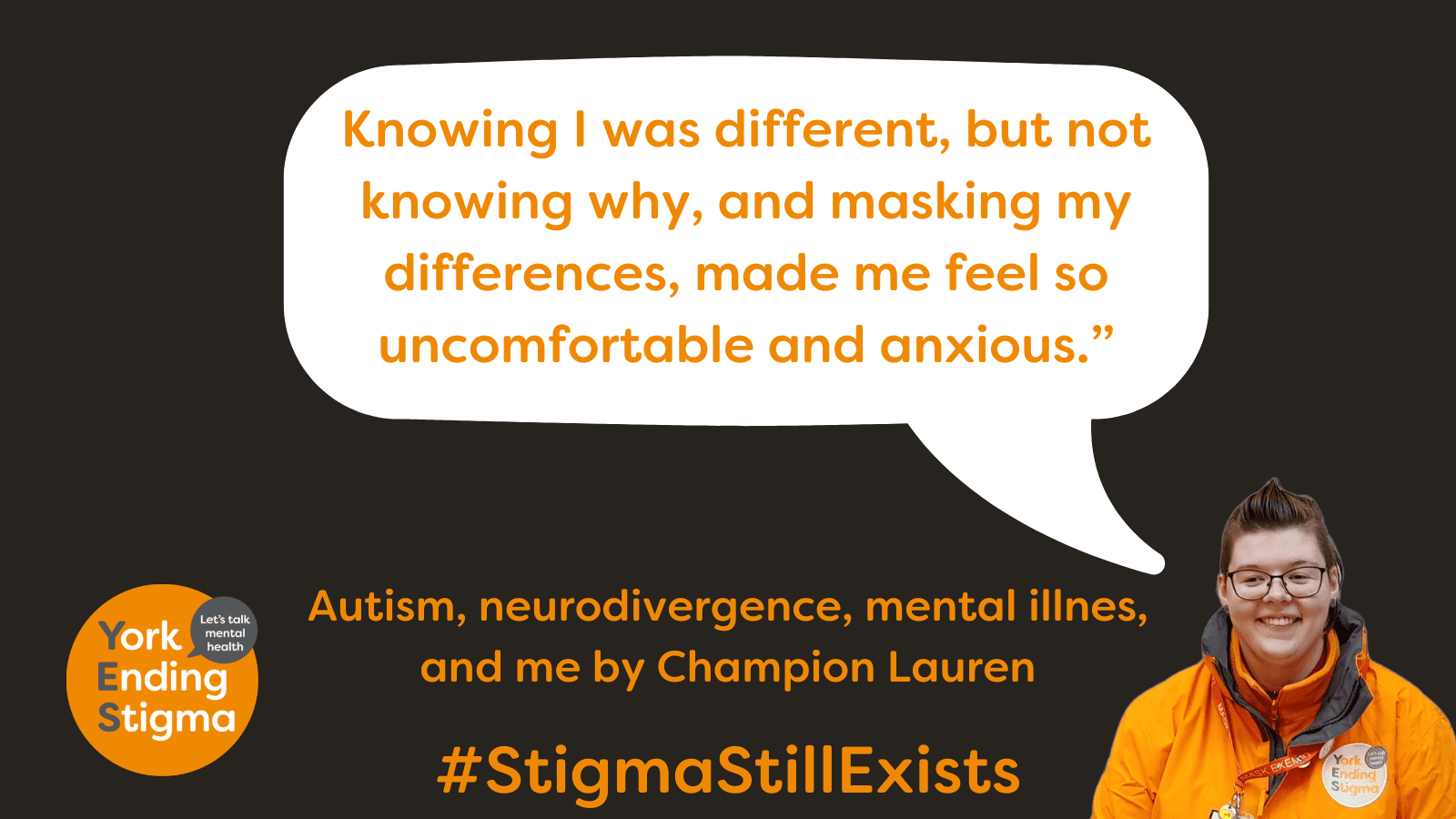
Autism, neurodivergence, mental illness and me. So, not exactly the snappiest choice of titles. But I’m saying what I mean, and what I know about. That’s me, not much of a filter but I mean what I say, and I try to be as honest as I can, while not oversharing. Being autistic isn’t a mental illness, neither is ADHD or dyspraxia – all of which I live with. I also live with various mental illnesses – Seasonal Affective Disorder, social anxiety, generalised anxiety disorder, and complex post traumatic stress disorder (cPTSD). Now, I also have the odd (see fair few) physical issues going on and therefore identify as disabled because of the combination of all of these conditions
“All my diagnoses relating to my mental health happened
before I was eventually diagnosed as autistic.”
It’s interesting really, as all my diagnoses relating to my mental health happened before I was eventually diagnosed as autistic, then I started to realise and get more comfortable in identifying as neurodivergent. I think there is definitely something to be said for the anxiety I’ve lived with (but never saw it as an issue or had a diagnosis until I was 23) about not knowing I was autistic, but knowing I was different and not knowing why, masking my differences, faking who I really was to ‘fit in’ and this making me feel so uncomfortable and so anxious.
“Knowing I was different, but not knowing why, masking my differences, made me feel so uncomfortable and anxious.”
I was bullied at school. I was trying to fit in to just look like everyone else, but I didn’t know I still looked “wrong” to them, a freak, that couldn’t read these strange social cues, and was often taken advantage of and used. I was academically high achieving and I think this meant a lot of the “problem” stuff was easy to miss. My social anxiety, looking back, probably started when I was maybe 7 or 8, as I knew there were differences about me, but didn’t have a name for them and this made me absolutely terrified to stand out, initially in school but then in pretty much most situations, and at home if there were unfamiliar people there or family members I didn’t know that well. I was always labelled as just being ‘shy’, or ‘rude’ or ‘ignorant’. No one understood then, I didn’t have the right words to explain how I was feeling, and to be honest thinking about it now, if I did, I don’t
know whether I would have said anything, as the bullying was bad enough without the spotlight coming onto me anymore.
“I was always labelled as just being ‘shy’, or ‘rude’ or
‘ignorant’. No one understood then.”
Part of my experience of being autistic, is that I find it incredibly uncomfortable to make eye contact with others, and particularly continuing maintaining it while holding conversation. I’ve always found this hard and it made me feel anxious going into situations that might need me to do this, particularly before being diagnosed and understanding that I don’t have to force myself to do that. I’ve found that if I’m not focusing on getting the “right” amount of eye contact and focusing on something else, such as the speaker’s hands, forehead, ears or wall for example, helps me to actually take in what’s they are saying to me, and not becoming increasingly anxious about whether I’m being rude, because I’m giving too much or not enough eye contact. I do make fleeting eye contact, but it’s on my terms. Masking meant I forced it for years which made me feel very uncomfortable and highly anxious in a lot of different social situations.
“I was burnt out and had a breakdown…and struggled to get myself back together.”
Masking for 27 years was exhausting, and that’s on top of a decade of school bullying, and unfortunately then followed with myself being the target of emotional abuse (twice), with the second being in the workplace. I was perfectly competent and qualified to do my job, however, because of my at the time unknown to me autistic and neurodivergent traits, which obviously aren’t a choice and something I can do nothing about, and additionally disclosure of my anxiety diagnoses, my then manager took advantage of me. Blaming things that had happened on my anxiety, calling my panic attacks “boring” and purposely causing meltdowns by messing up my routine, amongst other things surrounding coercive control and gaslighting. As a result I left with complex PTSD. I was burnt out and had a breakdown at the end of this period and struggled to get myself back
together, still not understanding these episodes (that I know now to be meltdowns).
“Having the space to be myself, being heard and understood. That made all the difference in the world to me.”
A few years later, in 2021, I found the job I’m in now. I had to face the consequences of recovery from coercive control and emotional abuse, and now coping with complex PTSD in somewhere new. I was (and am about to complete) in private therapy for everything that I had been unable to emotionally process….which is another autistic thing – I don’t always process at the same speed as someone who isn’t autistic, and as a combination with the complex PTSD, it’s a lot to take in. It’s true, the hardest thing is the first healthy relationship after you’ve been in an abusive one. Mine was a manager-employee one. Having to relearn that someone being decent to you is actually normal and is what should be happening, not having to tiptoe round them. Being understood when it comes to my mental health, and things that I do well. Being seen as me and not an illness, that’s what
I deserved all along. That and the autism diagnosis. I did an awful lot of grieving for what could have been, and had a few triggering moments with cPTSD. Having the space to be myself, being heard and understood. That made all the difference in the world to me. I’m always going to be autistic and neurodivergent. I’ll probably live with these mental illnesses for the rest of my life as well. But seeing there’s a person there, because there is, can make a big difference.
Resources in England
• Autism – www.autism.org.uk
• Anxiety – www.anxietyuk.org.uk
York Ending Stigma
To find out more about our work and to join us to end mental health stigma in York, please refer to our website https://yorkcvs.org.uk/york-ending-stigma/ or email us on yes@yorkCVS.org.uk
